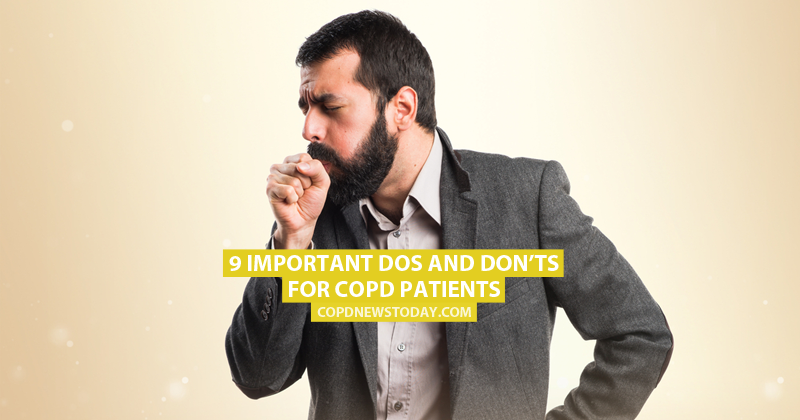9 Important Dos and Don’ts for COPD Patients

Living with chronic obstructive pulmonary disease (COPD) is difficult but with a few simple lifestyle changes, you can manage your condition and still enjoy life. We’ve created a list of dos and don’ts for patients with COPD with help from thehealthsite.com.
Do maintain a healthy weight.
COPD patients should work at either losing or gaining weight to be in the healthy weight range for their height. Work at improving diet so that it contains whole grains, fruits, vegetables and low-fat protein and less processed foods.
Do exercise regularly.
Exercise is essential for patients with COPD and you should aim for 30 minutes each day. Speak to your doctor about finding the right type of exercise for you.
Don’t forget your inhaler.
Make sure you have your inhaler on you at all times, as you never know when you might need it.
MORE: COPD patients talk about exacerbations and lung infections.
Do not stop treatment.
You might be feeling fine and think you don’t need your medications, but don’t stop any medications unless directed to do so by your doctor.
Don’t take cough medicine.
As a COPD patient, it’s important that you clear the excess mucus off your chest, which is the purpose of coughing. Suppressing your cough using over-the-counter medicines will lead to a build up of mucus that can leave you more vulnerable to infections.
Do use a humidifier.
Humidifiers can be extremely helpful in eliminating the dryness in the air which can dry out the tissues in the bronchial. Moist air will help to loosen mucus making it easier to cough up.
MORE: AffloVest can help clear lung mucus in COPD patients.
Don’t expose yourself to pollutants.
Pollutants which can cause airway irritations are everywhere, but it’s possible to limit your exposure to them. Avoid spray products such as cleaning sprays, perfumes, deodorants, air fresheners, etc., and minimize your exposure to outside pollutants like traffic fumes, fire smoke, chemical fumes and secondhand tobacco smoke.
Do practice breathing exercises.
Ask your health care team about breathing exercises and breathing control techniques you can do to help you when you feel short of breath or to help strengthen your lungs.
Don’t panic.
If you find yourself short of breath or feel your heart racing, it’s important that you stay as calm as possible. Practice breathing exercises until it subsides or if it happens regularly, speak to your doctor to ensure you’re taking the correct medication.
MORE: Four breathing control techniques to try.
COPD News Today is strictly a news and information website about the disease. It does not provide medical advice, diagnosis or treatment. This content is not intended to be a substitute for professional medical advice, diagnosis, or treatment. Always seek the advice of your physician or another qualified health provider with any questions you may have regarding a medical condition. Never disregard professional medical advice or delay in seeking it because of something you have read on this website.





